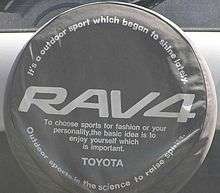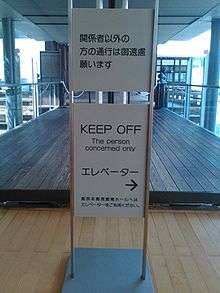Engrish




Engrish (/ˈɪŋɡrɪʃ/; Japanese: イングリッシュ Ingurisshu, IPA: [iŋ.ɡɯ̟ᵝ.ɾ̠ʲiɕ.ɕɯ̥ᵝ]) is a slang term for the misuse or corruption of the English language by native speakers of Asian languages.[1] The term itself relates to Japanese speakers' tendency to inadvertently substitute the English phonemes "R" and "L" for one another, because, unlike English, the Japanese language has only one liquid consonant (traditionally romanized with "R"). The related term "wasei-eigo" refers to pseudo-anglicisms that have entered into everyday Japanese.
While the term may refer to spoken English, it is more often used to describe written English. In Japan, it is common to add English text to items for decorative and fashion purposes. Such text is often added to create a cosmopolitan feeling rather than to be read by native English speakers, and so may often be meaningless or grammatically incorrect.
Engrish can be found in many places, including signs, menus, and advertisements. Terms such as Japanglish, Japlish or Janglish for Japan, Konglish for Korea, and Chinglish for China are more specific terms for Engrish.
Roots of the phenomenon
In Japanese Engrish, there are two contributing factors:
- First is the great difference between Japanese and English. Japanese word order, the frequent omission of subjects in Japanese, the absence of articles, a near-complete absence of consecutive consonants, as well as difficulties in distinguishing /l/ and /r/, or /θ/ and /s/ sounds, all contribute to substantial problems using Standard English effectively.[2] Indeed, Japanese have tended to score comparatively poorly on international tests of English.[3]
- The second factor has been the use of English for "decorative" or "design" rather than functional purposes;[4] i.e., for Japanese consumption, not for English speakers per se, and as a way of appearing "smart, sophisticated and modern", in much the same way as Japanese and similar writing scripts are used in Western fashion.[5] Indeed, it is claimed that in such decorative English "there is often no attempt to try to get it right, nor do the vast majority of the Japanese population ever attempt to read the English design element in question. There is therefore less emphasis on spell checking and grammatical accuracy."[6]
Other suggested roots
English is taught in Japanese schools with an emphasis on writing and grammar skills. Speaking skills are not developed in school nearly as much. The written word is taught using Romaji (Latin script); however, the correct pronunciation of the Romaji letters is not taught. The spoken word is taught using Katakana script. Katakana is a syllabary like Hiragana but is used specifically (inter alia) – analogously to italics in the Latin script – to denote foreign words (not just English, but also French, German etc). Katakana script is used in daily life for many foreign words used with Japanese ("Gairaigo").
The limitations of the Katakana script mean that R and L sounds are not differentiated; and similarly the sounds F and H are expressed by only one character. Furthermore, as Katakana is made up of syllables, not individual letters, there are usually included vowels that should be ignored in a Katakana English word, but are frequently pronounced. Conversely, soft letters are ignored. For example, the English word "start" used when referring to a race, is written in Katakana as スタート (su-tā-to). The restricted nature of the Katakana set of syllables is what causes the Engrish pronunciation. The answer to this is to teach spoken English using the Latin alphabet. Many Japanese people know how to write English very well, but are not confident speakers due to this issue. It is not uncommon to receive a perfectly well-composed e-mail in English from a Japanese person, only to find that in person they will not attempt to speak English, preferring to apologise that they cannot speak, only write English.
In popular culture
Instances of Engrish due to poor translation were frequently found in many early video games produced in Japan, often due to the creators not having enough (or not wanting to spend enough) money for proper translations. One well-known example of Engrish in pop culture is the translation of the video game Zero Wing which gave birth to the phenomenon All your base are belong to us, which also became an Internet meme. This phenomenon is parodied in Mario & Luigi: Superstar Saga, in which the character Fawful speaks Engrish. In the Japanese version of Mario & Luigi: Bowser's Inside Story (in which Fawful also appears as the main antagonist), in the same subseries, the character Broque Monsieur also speaks Engrish.
Engrish has been featured occasionally in the Trey Parker and Matt Stone cartoon South Park, such as the song "Let's Fighting Love", used in the episode "Good Times with Weapons", which parodies the poorly translated opening theme sequences sometimes shown in anime, and in Parker and Stone's feature length Team America: World Police where the late North Korean leader Kim Jong Il is depicted singing the song "I'm so Ronery".[7]
The British fashion brand Superdry, in a reverse parody of the phenomenon, has established a style of placing meaningless Japanese text such as 'Sunglasses company' and 'membership certificate' on clothing sold in Britain. The company explained to a Japanese television crew that most translations were done using simple automatic translation programs such as Babelfish.[8][9]
Monty Python's Flying Circus featured a parody of the drama series Elizabeth R, where they portrayed the cast riding motor-scooters and speaking Engrish, thus changing the title to "Erizabeth L".
In the 1983 film A Christmas Story, the Parker family goes to a Chinese restaurant for their Christmas dinner, and are serenaded by the waitstaff with Engrish Christmas carols, such as "Deck the harrs wis boughs of horry, fa ra ra ra ra ra ra ra ra" and "Jingre berrs, jingre berrs, jingre arr the way, oh what fun it is to ride in one-horse open sreigh!"[10]
See also
- All your base are belong to us
- Broken English
- Japanese Pidgin English
- Non-native pronunciations of English
- Perception of English /r/ and /l/ by Japanese speakers
- Wasei-eigo
References
- ↑ Ziemba, Christine N. (December 5, 2004). "Translate at your own risk". Los Angeles Times. Retrieved 13 June 2013.
- ↑ Dougill, John (2008). "Japan and English as an alien language" (PDF). English Today. 24 (1): 18–22. doi:10.1017/S0266078408000059.
- ↑ Kowner, Rotem (2003). "Japanese Miscommunication with Foreigners: In Search for Valid Accounts and Effective Remedies" (PDF). Jahrbuch des Deutschen Instituts für Japanstudien. 15: 117–151. Archived from the original (PDF) on 2014-08-01.
- ↑ Ikeshima, Jayne Hildebrand (July 2005). "Some perspectives on the phenomenon of "Engrish"" (PDF). Keio Journal of International Studies. 15: 185–198.
- ↑ Dougill, John (1987). "English as a decorative language". English Today. 3 (4): 33–35. doi:10.1017/S0266078400003126.
- ↑ Melin, Tracy; Rey, Nina (2005). "Emphasizing Foreign Language Use to International Marketing Students: A Situational Exercise That Mimics Real-World Challenges". Global Business Languages. 10: 13–25.
- ↑ Stuever, Hank (October 15, 2004). "Puppet Government 'South Park' Creators' Left Jab at Jingoism May Backfire". Washington Post. Retrieved 16 September 2011.
The North Korean dictator speaks in the voice of "South Park's" Eric Cartman, ... only with an Engrish accent. "I'm so ronery," Kim confesses in a pitiful ballad to himself, which explains his evil-doing -- he just needs to be ruvved.
- ↑ "Superdry: Popular UK Fashion Brand Uses Gibberish Japanese". Japan Probe. Retrieved 1 October 2014.
- ↑ "Superdry". Unmissable Japan. Retrieved 2 October 2014.
- ↑ StarWalker13 (April 26, 2009). "A Christmas Story Chinese Restaurant Scene" on YouTube
External links
| Look up Engrish in Wiktionary, the free dictionary. |
| Wikimedia Commons has media related to Engrish. |
- Engrish.com Examples of Engrish from Japan, China and elsewhere
- fahruz.org (2003–2007) Collection of Engrish and equivalents in French, German and Italian (archived on Wayback Machine March 3, 2016)
- Large Engrish photo collection on Weird Asia News
- Engrish Funny Photos of Engrish from around the world
- Translation Party Online tool demonstrating how phrases are lost in translation between English and Japanese